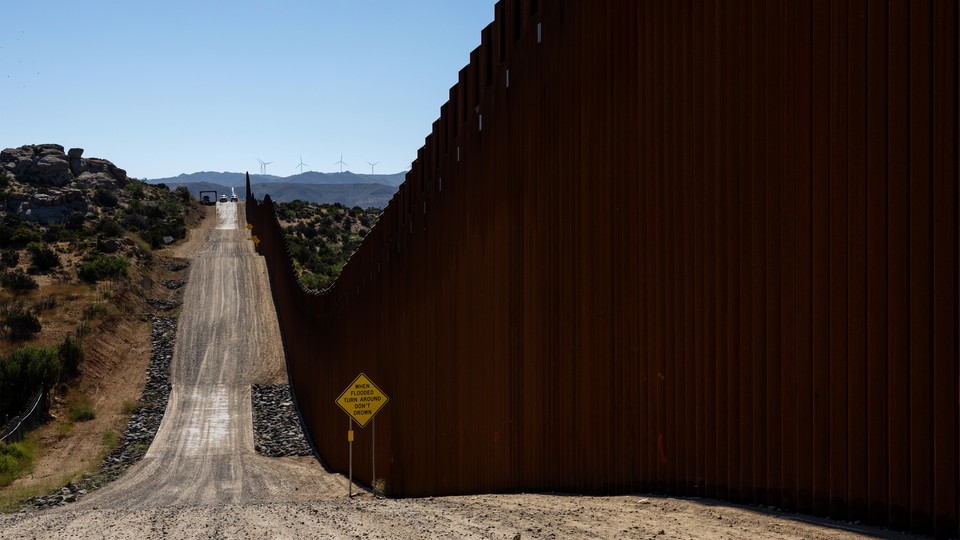The Orthodoxy That Doomed Democrats’ Border Policies
4 min read
President Joe Biden’s recent executive actions on asylum and other border-security issues mark more than a shift to a more restrictive immigration policy. They’re also a rejection of the narrative that progressive advocacy groups and Latino Democrats have been pushing for years: that the best way to woo voters in the nation’s largest ethnic minority is to push for a permissive immigration system.
The fear of offending Latino voters with significantly tighter border measures has hampered Democrats’ ability to forge a coherent immigration policy—even though recent polling shows more and more Latino voters expressing concerns about the current level of undocumented immigration and backing stricter controls. According to an Axios/Ipsos survey conducted in late March, nearly two-thirds of Latino respondents favored giving the president the authority to shut down the border. Only about 40 percent agreed with hard-line measures—a border wall, the deportation of all undocumented immigrants—but support for those ideas has jumped by about 10 points since late 2021.
Echoing a past proposal by former President Donald Trump, Biden announced Tuesday that he would essentially prohibit people who cross illegally into the United States from claiming asylum—an attempt to stem the inflow of unauthorized migrants. In the past, Democrats have been reluctant to offer border-security measures absent a more comprehensive immigration-reform plan that also includes a pathway to citizenship for undocumented immigrants and specific protections for so-called Dreamers—those who were brought into the United States as children.
In his 2020 campaign, Biden sharply criticized Trump’s draconian border policies and rhetoric. In office, he made greater use than his predecessors had of the president’s power to parole asylum applicants into the country while their applications await official action. But as the number of border crossings and asylum applications has shot upward and a divided Congress has failed to pass legislation on the subject, immigration has become a major political liability for Biden. So he made an about-face last week.
The response from some Latino Democrats and advocacy organizations was swift and harsh. “By reviving Trump’s asylum ban,” Senator Alex Padilla of California declared in a statement, “President Biden has undermined American values and abandoned our obligations to provide people fleeing persecution, violence and authoritarianism with an opportunity to seek refuge in the U.S.”
Opponents of Biden’s new policies are no doubt sincerely sympathetic to the people, from Latin America and elsewhere, seeking to build a new life. And indeed, the U.S. should offer asylum to people genuinely facing persecution overseas. Yet what that means in practice is subject to interpretation. Under Biden’s watch, the nation has drawn more migrants than it can accommodate in an orderly fashion. Ultimately, voters have the right to decide how welcoming or restrictive they want their country’s immigration policy to be.
Democrats were once divided on that question; many in the labor movement saw undocumented immigrants as competition for native-born workers. But as Latinos grew as a portion of the electorate—and voted Democratic in lopsided proportions—party strategists began to see them as a cornerstone of an enduring electoral majority.
What barely evolved over that same period was the party’s assessment of what Latinos want. It has continued to view Latinos as recent arrivals who are focused on immigration reform, farmworker issues, and the challenges facing undocumented people. The more that Democrats came to see Latino voters as their party’s future, the more they treated immigration policy as a form of identity politics. The strategy isn’t working. In 2012, 71 percent of Latino voters supported Barack Obama’s reelection, according to Pew Research Center, but in 2020 only 59 percent backed Biden. Polls suggest that his support this year may be still weaker.
Not coincidentally, this slide is occurring as more and more second- and third-generation Latinos are registering to vote. The percentage of new Latino voters who were born outside the country has plunged. The California political-data expert Paul Mitchell reported in January that in Los Angeles County, the nation’s most populous, 55 percent of new Latino voters were foreign-born in 2002; in 2022, fewer than 9 percent were. The immigration- and identity-related issues that galvanized newcomers in past decades may resonate less with subsequent, U.S.-born generations of Latinos.
Biden isn’t the only one in his party to recognize the need to move away from an outdated and politically destructive immigration-policy narrative. Recently, 26 members of Congress formed a group dubbed the Democrats for Border Security. The name acknowledges a major concern shared by voters of all ethnic backgrounds. The group’s very existence demonstrates that whatever benefit Democrats derived from using immigration as an ethnic wedge issue has vanished.
Fortunately for Biden, his prudent recalibration on the issue calls the Republicans’ bluff. Earlier this year, Republicans walked away from a deal that they had brokered—one in which Democratic leaders went along with their demands in exchange for more aid for Ukraine—showing that the GOP believes that a broken, dysfunctional border helps its prospects more than solving the immediate crisis would.
Biden’s new policy is likely to be challenged in court. Moreover, turning away asylum applicants who enter the country illegally is a logistical challenge requiring new resources that only Congress can authorize. Even so, Biden has shrewdly, if belatedly, co-opted Republican policies on asylum and border security—and escaped the political trap that Democrats put themselves in by having jumped to conclusions about who Latino voters are and what they want.



